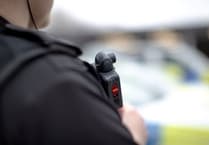A new scheme to identify people who are neurodivergent has been criticised, with some likening it to the yellow star forced upon Jews during the Holocaust.
The wristband scheme has been launched by Devon and Cornwall Police', to help first responders in an emergency situation. Its aim is to help them better understand and support the person they are dealing with.
After reporting on the scheme on TikTok, user Aurora borialis wrote: “Yellow star anyone?”
“Really terrible idea to have something on show at all times that marks you as different.”
Another user said: "Did we not learn about what happened in the 1930s when society went around branding vulnerable people?"
The idea is that green wristbands will be rolled out for neurodivergent people to wear, providing vital information about the person when scanned by emergency services.
This information could include medication details, preferred ways of communication, and contact information.
However, there is considerable public anxiety that labelling individuals as vulnerable may increase their risks in certain situations.
Noone Matey said: “This feels like a giant red flag to me. Why mark people out instead of training staff to be understanding of everyone?”
However, not everyone was against the idea.
One user said: “It's sounding like the equivalent of having cards in your wallets like organ donor card, or a DNR; a way to share your needs and wants in an accessible and easy-to-use format, to give you a voice in the moments you can no longer use it.
“They should probably be something as discreet as humanly possible for the safety and wellbeing of the holder of the identifier. Something obvious and visible would be a serious tool for much more unpleasant folks to take advantage of.”
Kelly added: “I think the idea is clever, but I don’t think a wristband is the best option. Would much prefer a card (like the organ donor one etc) or something similar.
“A bracelet is more visible and could make us more vulnerable to harm from the public.
Others suggested focusing on training rather than wristbands.
In response to the concerns, a spokesperson from Devon and Cornwall Police said: "We are fully aware that the band is only the start of a wider issue regarding how emergency services can better tailor their responses to neurodivergent individuals.
"Wearing and using the wristband is a choice for the user and is intended for people who feel this may be beneficial for them; it is entirely up to the individual.
"Despite the trial only recently starting, we understand the bands are not suitable for everyone, with many choosing not to wear them.”
The spokesperson added: “We have gathered much helpful feedback and have since gone back to the company involved in the wristbands to design and supply alternatives such as key fobs and discreet scannable cards.”
The force re-emphasised that it is up to the user to input information they are comfortable sharing on the wristband, which could include any adjustments needed and preferred communication methods. This would help ensure the best support in emergency situations.
“Data input on the wristbands is not held or retained by the police or other emergency services nor is it stored anywhere other than the bands,” the spokesperson continued. “The bands are not owned or run by the police, nor is any data collated by the police or other emergency services.
“There is also no ‘register’ of neurodivergent people.”




Comments
This article has no comments yet. Be the first to leave a comment.